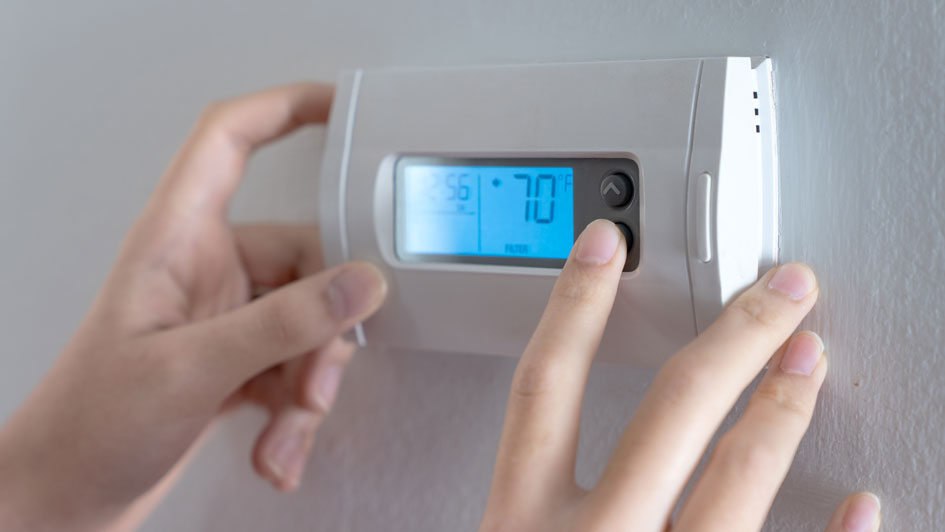
It's always nice when we manage to save money on our utility bills, but it just so happens there’s a way to keep costs down, even when you're out of the house.
The secret is your thermostat. By making the most out of your thermostat, you can help the thermostat plan for your preferred temperatures. That means you can have different temperature settings for when you’re at home, away or even when you’re asleep.
By trying a few of these schedules, you'll be able to enjoy comfortable temperatures while keeping more money in your pocket. Check out our guide on how your thermostat doesn't have to use up all your summer spending money:
While at Home
Whenever you're at home, you want a nice range of pleasant temperatures. For the most part, you probably have your thermostat lower in the summer while you are in the house to make the most of the cool air.
But in terms of energy efficiency, the best range for the summer is actually around 78 and 80 degrees Fahrenheit. By adjusting things a few degrees, you'll avoid the worst of summer while keeping your energy bill more manageable.
While Gone
If you're setting the temperature for a vacation or other trip away from the house, it's extremely common to move the thermostat higher than normal.
For some homes, you can set the thermostat to higher temperatures like 88 degrees while no one is home and then lower it back to the sweet spot of 78-80 degrees once you're home again. This way, your air conditioning unit won’t be working overtime to keep an empty house cool.
While Asleep
To enjoy a good night's sleep during the summer, you want your thermostat set at a comfortable temperature. A great place to start is between 68-72 degrees Fahrenheit. There's less risk of getting too hot or too cold while you're trying to sleep.
Other Strategies for Lowering Energy Use:
- Put in a smart thermostat: Trying a smart thermostat in the summer can lower energy costs as it forms temperature schedules according to your lifestyle and idea of what comfortable is. They can lower the temperature while you are home or sleeping, before allowing it to get warmer when no one is around. With reliable brands like the Lennox iComfort, you can adjust the temperature remotely through your smartphone, tablet or laptop. Requesting smart thermostat installation in your Genoa home can be the simplest strategy for maintaining comfortable, yet energy-efficient temperatures even when you aren’t home.
- Replace current equipment with a newer HVAC system: A high-efficiency HVAC system is another great option for long-term energy savings. With greater energy efficiency, you can also count on lower utility bills since more efficient equipment requires less energy to reach your preferred temperatures. Air conditioning installation in Genoa is a great way to beat the heat in the summer.
- Stay on top of routine AC maintenance: Investing in or ignoring regular air conditioning maintenance in Genoa can have a serious effect on your total monthly energy use. With regular cleaning of the coils, checking for damage and keeping vents clear of dust and debris, you may notice your HVAC system run more efficiently. Increasing efficiency also limits strain on important or delicate components and lowers operational costs, lowering total energy use and eventually the total monthly bill.
- Clean or replace the air filter on a regular basis: Cleaning or replacing the air filter regularly saves money by keeping airflow as smooth and consistent as possible. When filters become clogged, air conditioners have to work harder, and the strain can reduce the system’s life span and lead to breakdowns.
- Check your attic insulation: Insulation is a vital part of maintaining an energy-efficient home, securing the hot air outside and the cool air inside through summer. The North American Insulation Manufacturers Association (NAIMA) offers an official recommendation stating homeowners in souther states should have at least 13-14 inches of insulation, while colder climates do better with 16-18 inches.
- Review your air ducts: A leak in the air ducts could increase your energy bills much more than 20 percent, plus it can potentially allow harmful emissions from your water heater, clothes dryer and other appliances to get into the atmosphere of your home. Watching for signs of leaks and sealing them can help with both these issues.
- Seal all other leaky spots in your home: Sealing leaky spots in your home with caulk, foam sealant or weather-stripping helps keep things cooler during those hot summer days. Don't forget to check for any gaps around windows, doors and even outdoor fixtures. Making time to seal leaks now can help you save a lot over time.

